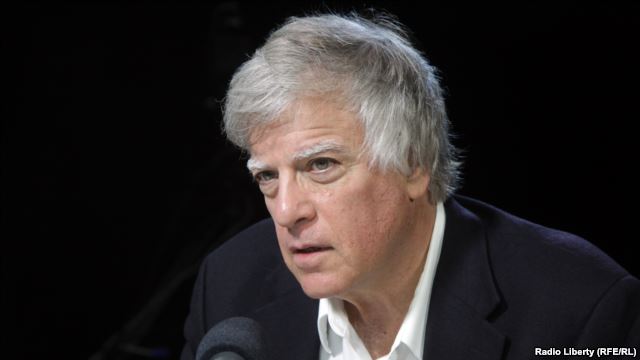BBG Watch Exclusive

David Satter, an American journalist and advisor at U.S. taxpayer-funded Radio Free Europe / Radio Liberty (RFE/RL), posted a statement on his website rejecting official Russian explanations for the denial of his journalist’s visa to work in Russia.
David Satter said that he had complied completely with all instructions from the Russian Foreign Ministry regarding registration and application for a new journalist’s visa.
Russia’s Foreign Ministry says David Satter, an RFE/RL adviser who was denied a visa to return to Moscow, has “grossly violated” the country’s visa-entry rules. The Russian Foreign Ministry statement was reported on the Voice of Russia English language website and on RT (Russia Today) website.
RFE/RL President Kevin Klose said on January 14 that “the company and Mr. Satter acted in good faith at all times to conform to all instructions conveyed from the Russian Foreign Ministry regarding Mr. Satter’s visa application.”
Media freedom NGOs believe that the Kremlin and its security services are behind the decision to deny Satter a journalist’s visa because of his hard-hitting news reporting from Russia and Ukraine.
David Satter said in his statement that “this is an ominous precedent for all journalists and for freedom of speech in Russia.”
The following statement was just posted on David Satter’s website.
UPDATE: In reference to the mendacious statement of the Russian Foreign Ministry of January 14
There are a number of points that need to be made in reference to the statement of the Russian Foreign Ministry regarding the decision to refuse me a visa and bar me from the country for five years.
1. During the entire period of the discussion of my visa, I have complied completely with all instructions from the Russian Foreign Ministry regarding registration and application for a new journalist’s visa.
2. I arrived in Moscow on September 7, 2013 to work as an adviser for Radio Liberty. At the time, I had a business visa which allowed me to remain in the country for 90 days out of each 180. Shortly after receiving accreditation, I made preparations to convert my business visa which expired on January 14, 2014 to a journalist’s visa which provided for permanent residency.
3. On November 18, 2013, the visa bureau in Prague which services the Russian Embassy refused to accept the letter of invitation from the Russian Foreign Ministry on the grounds that it was improperly prepared. On November 19, the Russian Consulate in Prague accepted the letter but a day was lost reducing my ability to complete business in Prague. The period of the invitation ended on November 21, 2013. The Russian Foreign Ministry advised me that if I arrived in Russia on November 21, the last day of the invitation, which provided the basis for a one time entry visa, a new invitation would be given to me on November 22 which could on that day be presented to the Russian Immigration Service that would in turn issue the needed journalist’s visa. Under these circumstances, there would be no gap in time and the bureaucratic requirements would be satisfied.
4. On November 22, the Foreign Ministry said that my invitation was not ready. They assured me that this was not a problem and that my visa had been approved. On Monday, it was still not ready. On Tuesday, the invitation was issued but the immigration service did not accept it on the grounds that I had overstayed my visa. The delay was created by the deliberate actions of the Foreign Ministry which did not deliver my invitation on November 22.
5. The Foreign Ministry in their statement state that I overstayed my visa after November 21. The invitation which I received on November 26 was dated November 22. In other words, it is consistent with what I was told – that I could arrive in Moscow on the 21st and pick up the invitation letter on the 22nd. The reason why the invitation was picked up on the 26th was because there was a delay created by the Foreign Ministry. This was followed by a weekend and then one day of further delay.
6. On the advice of the Foreign Ministry, I took steps to rectify the situation that they had created. I went to court, paid a fine for overstaying my visa and left the country. The Foreign Ministry advised me to start the visa application process again and I went to Kiev.
7. On December 12 in Kiev, I was notified that the visa had been approved and that I would be receiving a number shortly. On December 16, I was told again that the visa was approved. On December 23, I was given a number for the Foreign Ministry invitation – 3032073 – and a number for the telex – 87897/837.
8. On December 24, I went to the Russian Embassy in Kiev with the number of my invitation and the number of the telex from the Foreign Ministry. The Consul in the Russian Embassy said that he had the number of the invitation but no invitation. I asked him if this had ever happened before. He said no. He made two more attempts to locate the invitation without success. I called the Foreign Ministry and spoke to Lev Lvovich (whose last name I don’t know.) He said that the visa was ready and I should go back to the embassy on the following day and speak to a senior diplomat, Alexei Gruby.
9. On December 25, I called Gruby to arrange a meeting. He told me that he had a statement to read to me. It said: “The competent organs have decided that your presence on the territory of the Russian Federation is undesirable. Your application for entry into Russia is denied.”
10. On December 26, the U.S. Embassy issued a note of protest and the fact of the visa denial was confirmed. Attempts for three weeks to learn the reason for the refusal were unsuccessful. The Foreign Ministry stated that “according to Russian law, the reasons for refusals are not divulged.”
11. On January 14, 2013, the Foreign Ministry, ignoring its earlier claim about the demands of Russian law, issued a statement saying that I was banned from Russia for five years because I had overstayed my visa by five days. They did not mention that they were responsible for not providing the promised invitation that would have made it possible to obtain a visa on November 22 and, in that way, avoid any violation. There is also no mention of the fact that a number was issued on December 23, a month after the incident by the Foreign Ministry for a new invitation to be taken to the Russian Embassy in Kiev.
12. The real reason for my refusal was the one given by Alexei Gruby in Kiev. I was expelled from the country at the demand of the security services. This is an ominous precedent for all journalists and for freedom of speech in Russia.
